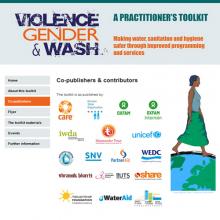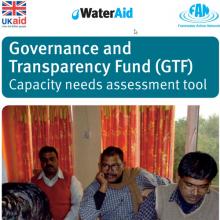
Herramienta de evaluación de las necesidades de capacitación del Fondo de Gobernanza y Transparencia (GTF)
This tool was developed by WaterAid and the Freshwater Action Network under funding by the UK government's Governance and Transparency Fund (GTF), which ran from 2007-2014 (See UK website GTF disclaimer here). The tools and learnings generated from the GTF and its partners are freely available still relevant. The primary purpose was to develop ‘strong and well-functioning Civil Society Organizations (CSOs) and CSO networks capable of influencing the design, implementation and evaluation of effective water, sanitation and hygiene (WASH) policies at all levels’. To identify and support partners’ capacity needs, a GTF working group was established to develop a systematic capacity needs assessment (CNA) tool.
The resulting tool was designed to be used directly with CSOs, CSO networks or local government partners. The tool was applied in 16 targeted countries (across Africa, Asia and Central America) and 31 civil societyorganisations(CSOs) and CSO networks. Practical notes for implementation based on these experiences are included in the tool publication. The guidance notes provide an overview of how to use the CNA tool in a group setting, explaining some of its key features and highlighting key considerations for leading the assessment process.
The tool can be used for:
- Decision-making about whether to support a new/existing partner (or not).
- Extending or expanding support to existing partners or shifting their role and responsibilities.
- Responding to partner demand for assessment or capacity support.
- Compliance with programmatic needs or reporting; either as a monitoring and evaluation exercise, to fulfil new programme requirements, or to deal with underperformance or a skills shortage.
- Determining an exit strategy for ending a relationship with a partner, either because they no longer fulfil the required purpose or they are strong, well capacitated and can stand on their own (i.e. using the tool to determine if capacity has been successfully and satisfactorily built).
The tool is presented as a form of cumulative Likert scale with ‘grades’ one to four representing a progression in thinking and practice. The aim is that partners use the grades to identify where they are now and to stimulate debate around what a realistic but ideal set of skills might be and what improvements could usefully be made to get the organisation to that point.
Evaluaciones
Aún no hay evaluaciones
Escribe la primera evaluación " Herramienta de evaluación de las necesidades de capacitación del Fondo de Gobernanza y Transparencia (GTF) "
Enviar una evaluación de una herramienta
Informes de implementación
Enviar un informe de implementación
Otras herramientas que pueden interesarle


